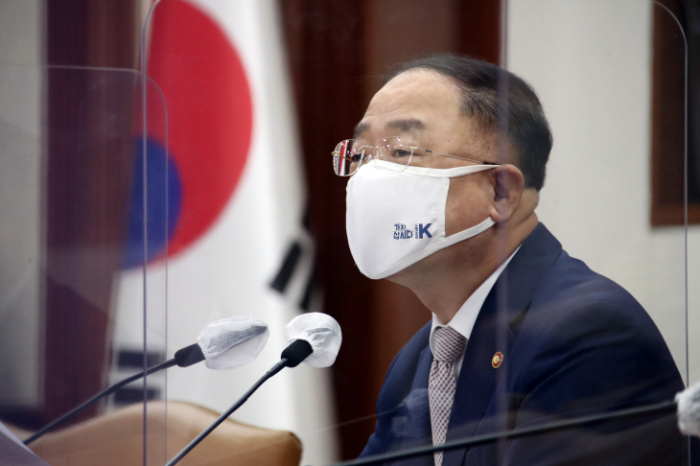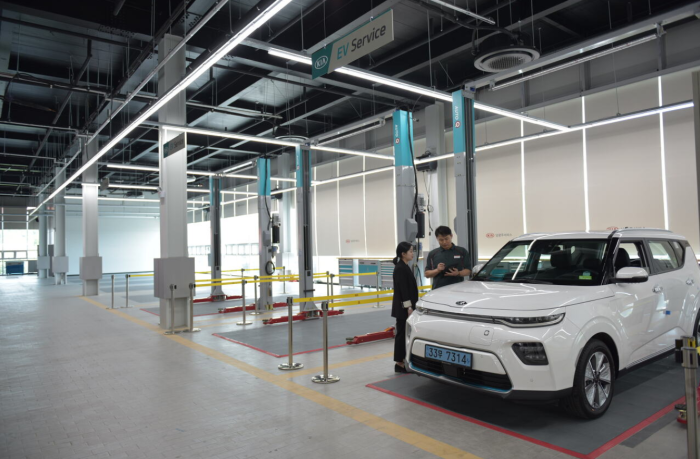Future mobility
S.Korean govt to spend $5.4 bn to develop sensors, improve EV repair
Public funds will flow into setting up EV-specific maintenance shops, with players like Kia to potentially benefit
By Aug 30, 2021 (Gmt+09:00)
2
Min read
Most Read
LG Chem to sell water filter business to Glenwood PE for $692 million


KT&G eyes overseas M&A after rejecting activist fund's offer


Mirae Asset to be named Korea Post’s core real estate fund operator


StockX in merger talks with Naver’s online reseller Kream


Meritz backs half of ex-manager’s $210 mn hedge fund



South Korean government will spend 6.3 trillion won ($5.4 billion) next year in supporting the state-designated Big 3 industries: future vehicles, non-memory semiconductors and bio-health.
Finance Minister Hong Nam-ki said on Aug. 30 during the government’s 14th regular meeting for innovative growth that next year’s budget in the Big 3 sectors will be ramped up by 43% to 6.3 trillion won ($5.4 billion).
Over the past three years, the government has funded about 10 trillion won ($8.6 billion) in the three strategic sectors: 2.2 trillion won ($1.9 billion) in 2019, 3.2 trillion won ($2.7 billion) in 2020 and 4.4 trillion won ($3.8 billion) to be spent within this year.
The country’s long-term objectives in these three areas are to become the world’s largest maker of the next-generation secondary batteries by 2030, set up the world’s best semiconductor supply chain by 2030 and become the world’s top five vaccine producer by 2025.
Hong highlighted that the government will foremost focus on expanding the electric vehicle (EV) repair and maintenance infrastructure across the country. The government aims to increase the number of EV-specialized repair shops in South Korea from 1,100 last year to 3,300 by 2025.

“While the global transformation from internal combustion vehicles to EVs are occurring faster than ever, South Korea lacks EV-specific repair shops as well as maintenance professionals, equipment and inspection system,” said the finance minister.
The government will help the repair shops in procuring EV inspection equipment and also train 46,000 EV maintenance professionals by 2024. The minister added that the education and training of these new professionals will be done by obligating the current workforce to take courses in future mobility, as well as changing the curriculum of the vocational colleges for automotive mechanics.
The government will also fund the expansion of warranty support for battery repair from the current 2 years/40,000 km to 3 years/60,000 km. R&D investment will be also increased, especially in developing more effective and efficient battery management systems (BMS).
The increased government budget for 2022 will also be spent heavily in developing sensor technologies. High-tech sensors, which detect and convert light and sound to electric signals, are regarded as essential components in autonomous vehicles and next-generation smartphones. While the global sensor market is growing faster than ever and will reach $332.8 billion by 2025 versus $193.9 billion in 2020, South Korea only holds about 2% of the industry.
For a higher market share in the global sensor market, the government will launch a new K-sensor R&D project by funding 200 billion won ($171 million) to develop original sensor technologies and accelerate their commercialization.
In the bio-health sector, the government said it will foster a total of eight companies by 2030 to become the global market leaders: two in pharmaceuticals, four in cosmetics and two in medical devices.
Write to Jin-gyu Kang at josep@hankyung.com
Daniel Choe edited this article.
More to Read
-
 EarningsHyundai Motor, Kia post strong Q2 profits; Chip shortage dims outlook
EarningsHyundai Motor, Kia post strong Q2 profits; Chip shortage dims outlookJul 22, 2021 (Gmt+09:00)
3 Min read -
 Future MobilityHyundai Mobis targets in-vehicle healthcare with brainwave technology
Future MobilityHyundai Mobis targets in-vehicle healthcare with brainwave technologyJul 21, 2021 (Gmt+09:00)
2 Min read
Comment 0
LOG IN


